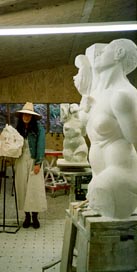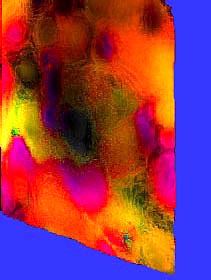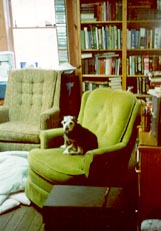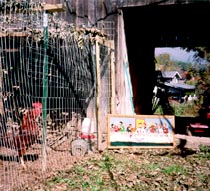|

 Graphic: Collene Karcher Stonecarving Studio & Gallery, Sylva NC Graphic: Collene Karcher Stonecarving Studio & Gallery, Sylva NC
Gary Carden, a native of Sylva NC, received his Master of Arts degree in English and Theatre from Western Carolina University. He's a storyteller, actor, professor, playwright and free-lance writer whose work appears in regional hardcopy publications, such as Smoky Mountain News, and in A Country Rag. His books -- Belled Buzzards, Hucksters & Grieving Spectres : Strange & True Tales of the Appalachian Mountains, written with Nina Anderson, Mason Jars in the Flood and Other Stories, and Papa’a Angels: A Christmas Story, a collaboration with Collin Wilcox Paxton, et al -- are available through his website at tannerywhistle.com or through Amazon. He turned 65 this year.
Perspectivesby Jeannette Harris Gary Carden, as people who know him at all know, lives now in the home he was raised
in, coming to terms perhaps with the forces that shaped his life and with everyday
adjustments to his increasing deafness and diabetes-related visual impairment. It’s
interesting, but not always to the person afflicted and challenged, what specific
disabilities artists in particular are called upon to confront. A painter going blind, a
teacher unable to converse, share ideas and images verbally, the passions of a life
diminished by fate and fury. Time enrages us. This is not what we wanted in our later
years. Calamities have been unkind.
Gary Carden, as people who know him at all know, lives now in the home he was raised
in, coming to terms perhaps with the forces that shaped his life and with everyday
adjustments to his increasing deafness and diabetes-related visual impairment. It’s
interesting, but not always to the person afflicted and challenged, what specific
disabilities artists in particular are called upon to confront. A painter going blind, a
teacher unable to converse, share ideas and images verbally, the passions of a life
diminished by fate and fury. Time enrages us. This is not what we wanted in our later
years. Calamities have been unkind.Paint on the old farmhouse peels, reveals gray stubborn boards of its birth. Two cats curl on one of Gary’s new joys, a comfortably gliding wooden chair. Bookshelves, formal and connived, line every wall not taken by electronics, some discovered at yard sales to be resuscitated by clever friends -- televisions monumental and suburban, VCRs, CD players, DVD consoles, a computer of course, speakers. Newspapers pile and spill over a couch in the front room.
Note: Recently a massive investigation by the Hyatt Report discovered thousands of handicapped people had been refused their disability rights under Social Security. After torturous bureaucratic years, Gary Carden received assistance he needed through efforts of a state federal representative, Jesse Helms, and his personal lawyer. |

Everybody Knows Everybody knows that the dice are loaded. Everybody rolls with their fingers crossed. Everybody knows that the war is over. Everybody knows the good guys lost. Everybody knows the fight was fixed. The poor stay poor, the rich get rich. That's how it goes. Everybody knows. Everybody knows that the boat is leaking. Everybody knows the captain lied. Everybody got this broken feeling like their father or their dog just died. Everybody talking to their pockets. Everybody wants a box of chocolates and a long stem rose. Everybody knows. Everybody knows that you love me, baby. Everybody knows that you really do. Everybody knows that you've been faithful, give or take a night or two. Everybody knows you've been discreet, but there were so many people you just had to meet without your clothes. And everybody knows. And everybody knows that it's now or never. Everybody knows that it's me or you. And everybody knows that you live forever when you've done a line or two. Everybody knows the deal is rotten. Old Black Joe's still pickin' cotton for your ribbons and bows. And everybody knows. Everybody knows that the Plague is coming. Everybody knows that it's moving fast. Everybody knows that the naked man and woman are just a shining artifact of the past. Everybody knows the scene is dead, but there's gonna be a meter on your bed that will disclose what everybody knows. And everybody knows that you're in trouble. Everybody knows what you've been through, from the bloody cross on top of Calvary to the beach at Malibu. Everybody knows it's coming apart: take one last look at this Sacred Heart before it blows. And everybody knows. -- Leonard Cohen, from the album More Best Of, 1997 |

Questions? Comments? Email Gary Carden.
| LinkExchange Member | Free Home Pages at GeoCities |
text © Jeannette Harris, graphics © Gary Carden, 2000. All rights reserved.
|
Click here for Next Section (Native Days) |
 A Country Rag
A Country Rag This morning the fireplace is filled with logs and lit, its frame and mantle painted in the
bold mountain colors of country, primary blues and reds. Gary fixes a late breakfast --
scrambled eggs, salted ham, muffins, potatoes. Leonard Cohen’s Everybody Knows is
playing through the speakers and one of many sets of earphones. Teddie, the rat terrier,
having done his aging best to help in the war against rats, now tunneling beneath corn
feedings in the barn, sleeps on a quilt, dreaming perhaps of his next ride in the
commodious van Gary’s bought for traversing the Smokies to readings and tellings. His
name, his fame are spreading but he has no idea how
This morning the fireplace is filled with logs and lit, its frame and mantle painted in the
bold mountain colors of country, primary blues and reds. Gary fixes a late breakfast --
scrambled eggs, salted ham, muffins, potatoes. Leonard Cohen’s Everybody Knows is
playing through the speakers and one of many sets of earphones. Teddie, the rat terrier,
having done his aging best to help in the war against rats, now tunneling beneath corn
feedings in the barn, sleeps on a quilt, dreaming perhaps of his next ride in the
commodious van Gary’s bought for traversing the Smokies to readings and tellings. His
name, his fame are spreading but he has no idea how  The hot tub’s filled with warm water now and the jets are on. From the platform, facing
west, undulations of mountain crests he’s focused on since childhood stretch between a
frame of leaves and sky. A killing frost the night before has left mimosa pods fallen,
circling a nearby tree. Come here, he beckons casually, and I walk barefooted, earphones
on, toward the barn. The old farm’s nearly hidden by generational foliage still hanging
on. How many places are left in the world where one can dance freely to the beat of
change under an autumn sun. Between red roosters and a pair of game chickens, a
room’s been cleared. Gary’s made a small workspace for painting and the gourds he
grows. “The Last Brunch,” a parable in oil depicting Christ and his disciples at the table
of an unidentified 20th century fraternal order, similar to Kiwanis or Lions Club, leans
against fragile boards near a sawhorse holding the dried vegetable hollowed out and
painted as Santa Claus. His artistic style is modern primitive, two-dimensional. If he
sells a favorite piece, he’ll recreate it slightly differently.
The hot tub’s filled with warm water now and the jets are on. From the platform, facing
west, undulations of mountain crests he’s focused on since childhood stretch between a
frame of leaves and sky. A killing frost the night before has left mimosa pods fallen,
circling a nearby tree. Come here, he beckons casually, and I walk barefooted, earphones
on, toward the barn. The old farm’s nearly hidden by generational foliage still hanging
on. How many places are left in the world where one can dance freely to the beat of
change under an autumn sun. Between red roosters and a pair of game chickens, a
room’s been cleared. Gary’s made a small workspace for painting and the gourds he
grows. “The Last Brunch,” a parable in oil depicting Christ and his disciples at the table
of an unidentified 20th century fraternal order, similar to Kiwanis or Lions Club, leans
against fragile boards near a sawhorse holding the dried vegetable hollowed out and
painted as Santa Claus. His artistic style is modern primitive, two-dimensional. If he
sells a favorite piece, he’ll recreate it slightly differently. We’re sitting on the side porch with our coffees and reading, of course. With his hearing
loss, books and captioned movies have progressed from lifetime interest to requisite
obsession. Gary says the deafness shuts him out, accuses me of being in my own,
alienated world and I say: it’s difficult to converse. We try harder. I speak more slowly,
distinctly; he watches my face and gestures intently. And finally we are talking back and
forth about our experiences on earth, from birth, our devotions, emotional callings for
people, places and things, how we and others convert trauma to endeavor, spirit and
creativity. Deafness becomes a background, like the mountains, we hardly notice in an
exploration of who we and others are, where we came from and where we might be
headed. Of course, nothing is settled. We drift on: Gary to his stories and musings,
accommodations for a world of interior, garbled sound and me to peaks of the Qualla
Boundary where my memory, inflating and collapsing like bellows over a fire, mimics
the “blue mist” forming and breaking where an elder tells me black panthers (known as
painters here) greet special souls if they’ll sit quietly at that highest crest of the highest
mountain peak, right over there, just like the dreams of childhood.
We’re sitting on the side porch with our coffees and reading, of course. With his hearing
loss, books and captioned movies have progressed from lifetime interest to requisite
obsession. Gary says the deafness shuts him out, accuses me of being in my own,
alienated world and I say: it’s difficult to converse. We try harder. I speak more slowly,
distinctly; he watches my face and gestures intently. And finally we are talking back and
forth about our experiences on earth, from birth, our devotions, emotional callings for
people, places and things, how we and others convert trauma to endeavor, spirit and
creativity. Deafness becomes a background, like the mountains, we hardly notice in an
exploration of who we and others are, where we came from and where we might be
headed. Of course, nothing is settled. We drift on: Gary to his stories and musings,
accommodations for a world of interior, garbled sound and me to peaks of the Qualla
Boundary where my memory, inflating and collapsing like bellows over a fire, mimics
the “blue mist” forming and breaking where an elder tells me black panthers (known as
painters here) greet special souls if they’ll sit quietly at that highest crest of the highest
mountain peak, right over there, just like the dreams of childhood.